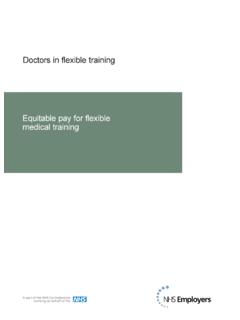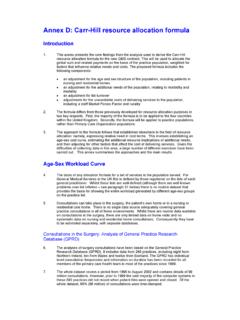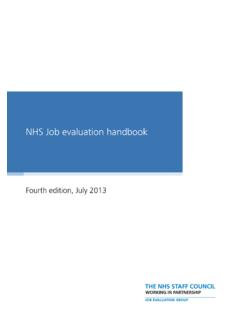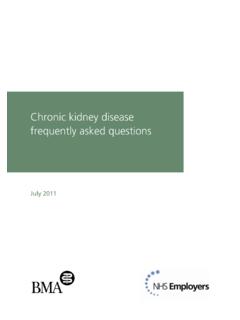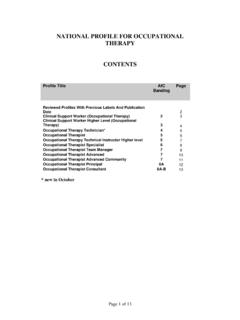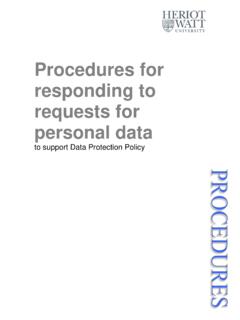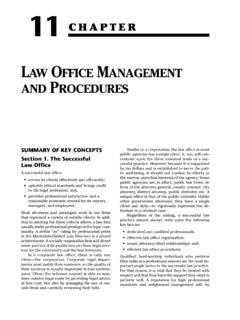Transcription of Guidance on time off requests 28 Jan - NHS Employers
1 Guidance on dealing with requests for time off January 2014 Contents 2 Introduction 3 Guidance on dealing with requests for time off for the NHS 4 Introduction 3 The NHS Staff Council's Equality and Diversity Group has reviewed the advice within the national terms and conditions handbook and developed supplementary Guidance on good practice in time off requests .
2 This offers good practice advice to managers on dealing with a range of sensitive time off request issues including fertility treatment, surrogacy and adoption. Guidance on dealing with requests for time off for the NHS 4 From time to time , Employers may be faced with requests from staff for time off that seem to have an equalities dimension but aren t explicitly covered by legislation for fertility treatment, gender reassignment processes and pre-adoption meetings. This Guidance is intended to help Employers deal with such requests by encouraging them to have fair and transparent processes.
3 A. Good practice recommendations Although there is no legal framework for many other requests for time off, Employers must be mindful of the possible ramifications that inconsistent decisions across an organisation can have. Having a standard, clear and transparent policy or procedure in place that applies to all staff will assist organisations in supporting all employees in all their diversity and will help avoid any potential ( indirect) discrimination claims. It is good practice for Employers to treat sympathetically any request for time off and they are encouraged to set up a standard procedure to cover a wide range of requests from all staff groups.
4 Staff may be enabled to take the time they need away from work by using paid leave, annual leave, or unpaid leave (or a combination of these). Any process should also respect the autonomy of staff and their problem solving abilities and should encourage rather than discourage/prevent staff seeking support from colleagues should they so wish. Ensuring confidentiality is maintained will be very important to staff as many requests may be of a very personal and sensitive nature. Staff will need to feel assured that any details they offer in support of their request will be handled sensitively and appropriately.
5 For example, Employers may want to consider designating a member of staff whom staff can inform on a confidential basis that that they are undergoing fertility treatment. Employers may wish to consider having an internal appeals process as part of their policy covering request for time off, to the next level of management, for such requests for time off. This could help to ensure that decisions are seen to be considered with due process and in lines with the needs of the service. It is recommended that all decisions are collated and monitored to ensure consistency.
6 The most common types of request for time off fall into four categories. 1. Fertility treatment The Equality Act (2010) Code of Practice states that treating a woman unfavourably because she is undergoing in vitro fertilisation (IVF) or other fertility treatment would not count as pregnancy and maternity discrimination. This is because a woman is not deemed pregnant until the fertilised ova have been implanted in the uterus. However, Employers should note that such unfavourable treatment could amount to sex discrimination. Although there is no statutory entitlement to time off for IVF or other fertility 5 treatment, in responding to requests for time off from a member of staff undergoing IVF, an employer must not treat them less favourably than they treat, or would treat, a member of staff of the opposite gender in a similar situation, as this could amount to sex discrimination.
7 After a fertilised embryo has been implanted, a woman is legally pregnant and from that point is protected from unfavourable treatment because of her pregnancy, including pregnancy related sickness. She would also be entitled to time off for antenatal care. Where a man requires time off for fertility treatment, the practice should be consistent in the organisation. 2. Surrogacy At present, a member of staff who becomes a parent through surrogacy has no statutory rights to time of work when their baby arrives. In 2015 the UK Government will be introducing adoption leave rights for parents through surrogacy.
8 Although the full details are yet to be confirmed, it is understood that parents through surrogacy will be entitled to two ante-natal appointments during a pregnancy, and adoption leave after the birth, and that this will be available to all couples eligible to apply for a parental order, including gay couples. Surrogate mothers will also retain their right to maternity leave to recover from the birth. Employers would be advised to ensure that their policies will reflect these changes on surrogacy, when the full details of the legislation are confirmed.
9 3. Gender reassignment Employees have the right to reasonable time off for gender reassignment appointments/treatment. time off may be paid or unpaid. If, however, the side effects of treatment make an employee unwell, normal sick leave and pay provisions apply. time off for gender reassignment appointments/treatments, whether paid or unpaid, should be considered separately for usual absence management purposes similar to disability. Indeed, EHRC Guidance says: Any reasonable absence because of the effects of treatment for gender reassignment should not normally be taken into account for the purposes of formal action for unsatisfactory attendance (for link, see below).
10 Any absence must be covered by a self-certificate or medical certificate in line with standard absence management policy and procedures. Employers are also reminded that under equality legislation they must ensure that trans staff do not suffer discriminatory behaviour or outcomes due to their absence or proposed absence from work for treatment associated with their gender reassignment, bullying and harassment. Gender reassignment is a protected characteristic under the Equality Act 2010 and that they therefore have a duty: not to penalise a trans person who takes time off for treatment associated with gender reassignment 6 to maintain the privacy and dignity of transgender people to ensure measures are in place to protect and assist a person who is undergoing transition to not treat a trans person less favourably for being absent from work because they propose to undergo, are undergoing or have undergone gender reassignment, than they would be treated if they were absent because they were ill or injured.
